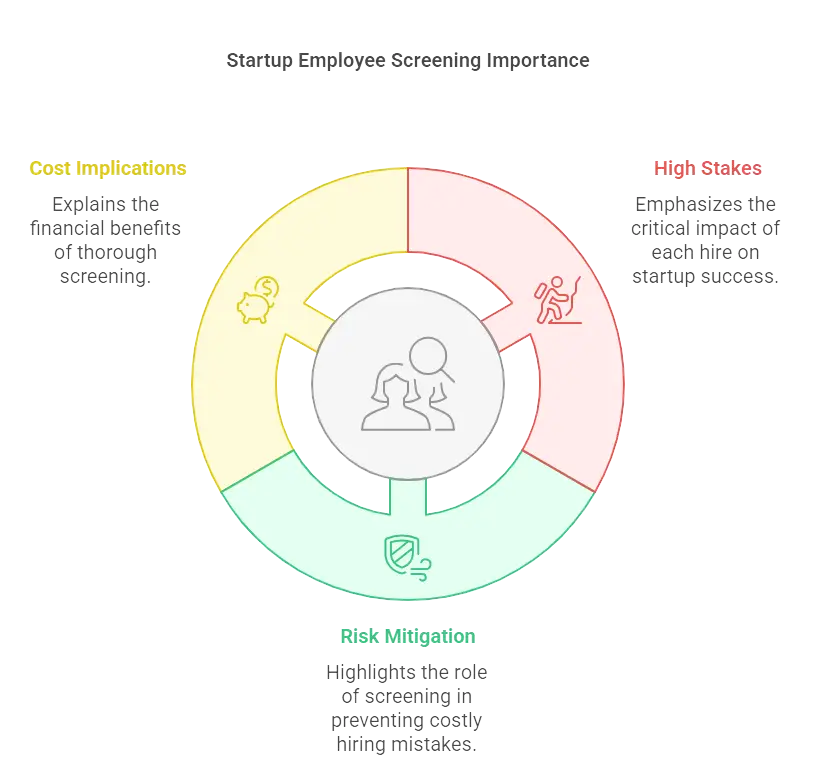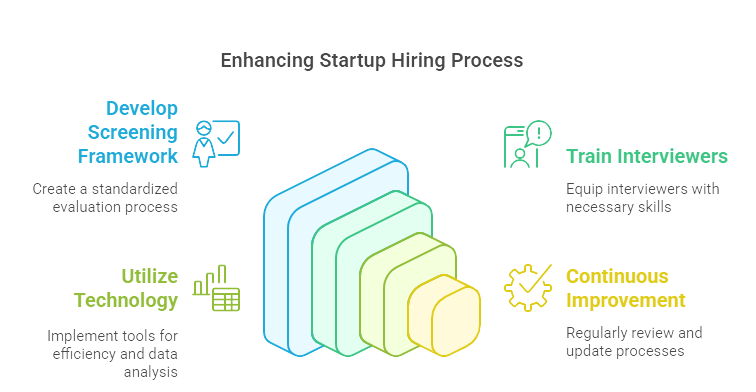Screening potential employees is crucial to building a successful startup. Unlike established companies, startups often operate with limited resources, making every hire critical. Ensuring that new employees are not only qualified but also a good fit with the company's culture and values is vital. This guide aims to provide a comprehensive overview of effective startup employee screening processes. It covers the importance of screening, various methods, and best practices to ensure that your startup secures the best possible talent.
Key Takeaways
- Startup employee screening is critical because each hire has a significant impact on the company's success due to limited resources and high stakes.
- Effective screening includes thorough background checks, reference checks, skills assessments, and culture fit evaluations to ensure the right hire.
- Legal considerations such as compliance with labor laws, anti-discrimination laws, and maintaining candidate confidentiality are crucial for a lawful and ethical hiring process.
- Best practices for startup screening involve developing a standardized framework, training interviewers, leveraging technology, and committing to continuous improvement.
- A robust and carefully implemented screening process helps avoid costly hiring mistakes and builds a team that aligns with the startup's mission and culture.
Introduction
Diligent screening can make or break a startup. Unlike established companies swaddled in layers of resources and redundancy, startups operate with lean teams where each member's contribution is pivotal. Every hiring decision carries immense weight, potentially tipping the scales toward either success or failure. This guide paints a clear roadmap for screenings in a startup landscape teeming with unique challenges and opportunities.
What's our aim here? It's pretty straightforward. We want to arm startup founders, small business owners, HR professionals, recruiters, and job seekers with practical, actionable advice on how to conduct effective employee screenings. We're breaking it down â from why it matters to how to do it, covering methods, legalities, and best practices.

So, what's the big picture? Effective screening ensures your startup isnâÂÂt just filling seats but assembling a team of people who are competent, trustworthy, and culturally aligned with your mission. Dive in to master the art of startup employee screening, a skill that could very well be your trump card in the high-stakes game of building a successful business.
As a person who has helped build teams from scratch in the mercurial startup ecosystem, I can tell you that vetting is anything but a choreâÂÂit's a defense of your culture, mission, and destiny. Every first-hire sets the tone for your office and the pulse of your brand. You cannot afford to take risks when you're in a low-resource environment. You need people who are not merely qualified, but essentially aligned to your orientation and eager to ride the rollercoaster with you. Thoughtful, intentional vetting is not gate-keepingâÂÂit's preserving the dream that you are working so feverishly to build.
Why Startup Employee Screening Is Crucial
Every hire in a startup isnâÂÂt just a new employee; theyâÂÂre a cornerstone of what could become a great company. In an environment where resources are lean and everyone wears multiple hats, the impact of each hire is magnified. Making the right decision is crucial.
The High Stakes of Startup Hiring: Startups donâÂÂt have the luxury of time or deep pockets; a bad hire can set back progress and eat up valuable resources. In these early stages, every team member significantly influences the companyâÂÂs trajectory. ThereâÂÂs no room for dead weight, and everyone needs to contribute effectively to help scale the business quickly and sustainably.
Risk Mitigation: Effective screening serves as a robust defense against various risksâÂÂwhether itâÂÂs a mismatch in skills, fraud, or a poor cultural fit. Thorough background checks, verifications, and interviews can save a startup from the costly consequences of hiring the wrong person. The stakes are high, and vigilance in the hiring process can act as a safeguard against potential pitfalls.
Cost Implications: The financial fallout from a poor hiring choice can be severe for a startup. Not only do you lose money on salary and training, but the indirect costsâÂÂlike the time spent correcting mistakes or the drop in team moraleâÂÂcan is enormous. Studies suggest that the cost of a bad hire can be several times their salary, an expense most startups canâÂÂt afford. By investing time and effort into a rigorous screening process, startups can avoid these financial drains and ensure a better return on their human resource investments.
In essence, employee screening isnâÂÂt just a step in the hiring processâÂÂit's a strategic move that can make or break a startup's success.

Methods of Startup Screening
Startup screening isn't just about finding candidates with the right qualifications; it's about securing individuals who will thrive in your unique environment. Startups need dynamism, resilience, and adaptability. Here are some methods to ensure you get the right people on board.
Background Checks
Importance: Background checks are your first line of defense. They help verify that your candidates are who they say they are, giving you peace of mind before extending an offer.
Components:
- Criminal history: Identify any past convictions that might be relevant to the role. Some offenses may be deal-breakers, while others might warrant deeper discussion.
- Employment verification: Ensure the candidate's work history is accurate. Confirm job titles, dates of employment, and reasons for leaving.
- Education verification: Confirm degrees and relevant certifications. This can uncover exaggerations or outright falsehoods.
- Credit history (if relevant): For roles that handle company finances, it's prudent to check credit history.
Resources: Dive deeper into what to look for with our internal Background Check Red Flags guide.
Reference Checks
Purpose: References provide third-party insights into a candidate's past performance and behavior. This can corroborate claims made during the interview process and reveal how they might fit within your team.
How to Conduct:
- Preparing questions: Tailor queries to the candidate's past roles and your startup's needs. Focus on job performance, teamwork, and areas for improvement.
- Contacting references: Reach out professionally. Email first, then follow up with a call if necessary.
- Interpreting the feedback: Look for consistent themes in responses. Are there any red flags or glowing endorsements that stand out?
Skills Assessment
Protocol: Testing a candidate's skills ensures they can handle the responsibilities of the role from day one. This can save your startup time and money on training and reduce the risk of costly mistakes.
Types of Tests:
- Technical tests: For technical roles, these assessments verify coding, engineering, or other specialized skills.
- Problem-solving exercises: Gauge a candidate's critical thinking and problem-solving abilities.
- Task simulations: Simulate common tasks they'll face in the role to see how they perform under pressure.
Personality and Culture Fit Assessment
Significance: At a startup, culture fit is paramount. Your first hires will shape the company's ethos and environment. Ensuring recruits align with your core values will help maintain a positive and productive workplace.
Assessment Tools
- Personality tests (e.g., MBTI, DISC): These can offer insights into how a candidate might interact with the team and handle stress.
- Behavioral interviews: Ask open-ended questions that reveal how the candidate has handled situations in the past. This can predict future behavior and cultural alignment.
Successful startup hires go beyond qualifications; they resonate with your company's vision and are eager to contribute to its mission. Use these methods to filter candidates meticulously, setting your startup on a path to success with a reliable, cohesive team.
Legal Considerations in Screening
Navigating the legal landscape is critical when it comes to screening potential employees. Non-compliance can lead to hefty fines and reputational damage, something no startup can afford. Here are the key legal aspects to keep in mind:
- Compliance with Labor Laws: Familiarize yourself with both federal and state labor laws to ensure your screening methods are lawful. The Department of Labor offers comprehensive guidelines that can help elucidate what is permissible. For instance, the Fair Credit Reporting Act (FCRA) has specific stipulations if you handle credit reports during screening, while the Fair Labor Standards Act (FLSA) mandates particular employment standards.
- Anti-Discrimination Laws: Adherence to the Equal Employment Opportunity Commission (EEOC) guidelines is crucial. This means making sure your screening process does not discriminate based on race, color, religion, sex (including gender identity, sexual orientation, and pregnancy), national origin, age, disability, or genetic information. Failure to comply can result in complaints, investigations, and penalties.
- Confidentiality and Privacy: Upholding candidate confidentiality is not just about ethics; it's also about legal obligation. Securely store all personal information gathered during the screening process to prevent unauthorized access. Only those directly involved in the hiring process should have access to this data. It's wise to inform candidates about how their data will be used and obtain their consent beforehand.
By ensuring your screening process is legally sound, you'll not only minimize risk but also foster a more trustworthy and respectful recruitment environment.
Best Practices for Startup Employee Screening
Develop a Screening Framework
Creating a standardized employee screening process is crucial for consistency and effectiveness. Start with a clear understanding of your startupâÂÂs core values and desired skill sets. Outline each step, from initial resume review to final interview, ensuring every candidate is evaluated against the same criteria. This minimizes bias and provides a structured approach to assessing candidates. Document this framework and update it as needed to reflect evolving business goals and industry standards.
Training for Interviewers
Invest time in training those conducting interviews and screenings. A well-prepared interviewer can better assess candidate competencies and cultural fit. Training should cover interview techniques, legal considerations, and how to interpret assessment results. Role-playing scenarios can be particularly effective in honing these skills. By doing so, you ensure that every interviewer is aligned with your screening process and capable of making informed hiring decisions.
Using Technology
Leverage technology to streamline your screening process. Applicant Tracking Systems (ATS), online assessment tools, and video interview platforms can save time and increase efficiency. These tools also provide valuable data analytics, helping you identify trends and areas for improvement in your hiring process. Choose software that integrates seamlessly with your existing systems and is scalable as your startup grows.
Continuous Improvement
Advocate for regular review and improvement of the screening process. Gather feedback from both interviewers and interviewed candidates to identify areas of weakness. Stay updated on best practices in the startup ecosystem and revise your processes accordingly. Continuous improvement ensures that your screening method remains relevant and effective, ultimately helping your startup secure top talent.
In summary, developing a robust screening framework, training interviewers, utilizing technology, and committing to continuous improvement are key practices that can significantly enhance your startupâÂÂs hiring process. Adopting these best practices will not only help you make better hires but also build a cohesive and productive team that aligns with your startupâÂÂs vision and goals.

Frequently Asked Questions (FAQ)
Got startup screening questions? You're in good company. From resume warning flags to the extent of background checks, to using personality tests, these everyday challenges have high stakes for lean teams. Below is a collection of carefully curated frequently asked questions (along with workable answers) to help you make intelligent, compliant, and informed hiring choices. Use them as your reference tool for startup screening gray areas.
How do I handle discrepancies in a candidate's resume?
First, assess the severity of the discrepancy. Minor inconsistencies in dates or job titles might be simple misunderstandings or clerical errors. However, misrepresented qualifications or roles demand more scrutiny. Always address the discrepancy directly with the candidate. This not only clarifies misunderstandings but also gauges their honesty and integrity.
What should I do if a candidate has a criminal record?
Evaluate the nature and relevance of the offense about the job. For example, a minor, non-violent offense from years ago might not be relevant for a coding position. Consult legal assistance if unsure about your obligations and potential liabilities. Importantly, maintain an open dialogue with the candidate; people can and do change, and their explanation could offer valuable context.
How comprehensive should a startup's background check be?
For startups, resources are often tight. Prioritize elements that directly impact the roleâÂÂemployment and education verification for precision skills, and criminal background checks for roles involving sensitive information or financial transactions. Tailoring the comprehensiveness to align with the position's responsibilities ensures due diligence without overextending your resources.
Are there legal risks in conducting personality tests?
Yes, there are legal risks, primarily revolving around potential discrimination claims. Ensure that any personality test used is scientifically validated and relevant to job performance. Avoid making decisions based solely on these tests. Instead, use them as one of several tools in your screening toolbox. Always abide by EEOC guidelines to mitigate legal risks.
Conclusion
This guide has walked you through the indispensable aspects of startup employee screening, detailing the significance of each hire, risk mitigation strategies, and cost implications. We've explored essential screening methods, including background checks, reference checks, skills assessments, and culture fit evaluations. Additionally, we have outlined the legal considerations and best practices necessary for creating a streamlined, effective screening process.
Prioritizing a robust screening process isn't just a checklist item; it's a cornerstone of your startup's success. With careful implementation, you can avoid costly hiring mistakes and build a team that not only meets the skill requirements but also fits seamlessly with your company culture.
To dive deeper, consider exploring further resources like the SHRM Toolkit on Background Investigations and the GCheck Blog. These additional materials offer more granular insights to refine your screening procedures.
By applying the knowledge from this guide, you equip your startup to attract and retain top-tier talent, paving the way for a cohesive, competent, and reliable team that will drive your business forward.
Additional Resources
- Managing Screening Vendors Effectively
- Screening Practices for the Legal Sector
- Screening for Startups: A Guide
- Pre-Hire Background Checks: Everything Employers Need to Know
- Balancing Screening and Fair Hiring
- Developing Comprehensive Screening Policies
- Screening in the Transportation Industry
- Screening Gig Workers: Challenges and Solutions
- Conducting Screening in the Financial Sector
- Staying Updated with Screening Changes
- Navigating Employee Screening in the Digital Age
- Key Metrics for Evaluating Employee Screening
- Screening for Remote Workers: Best Practices
- Minnesota Background Check Laws: A Comprehensive Guide
- Top Tools for Employment Screening
- Ensuring High Accuracy in Employee Verification
- The Future of Digital Employee Screening
- South Dakota Background Check Laws: A Guide for Employers
- Tennessee Background Check Laws: Compliance Tips for Businesses
- Illinois Background Check Laws: Key Points for Employers

GCheck Editorial Team
Meet the GCheck Editorial Team, your trusted source for insightful and up-to-date information in the world of employment background checks. Committed to delivering the latest trends, best practices, and industry insights, our team is dedicated to keeping you informed.
With a passion for ensuring accuracy, compliance, and efficiency in background screening, we are your go-to experts in the field. Stay tuned for our comprehensive articles, guides, and analysis, designed to empower businesses and individuals with the knowledge they need to make informed decisions.
At GCheck, we're here to guide you through the complexities of background checks, every step of the way.






